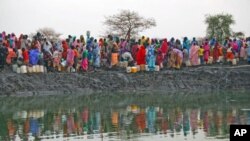Civilians in Sudan's Southern Kordofan and Blue Nile states are in need of food aid and are fleeing fighting between local militia and government troops. U.S. officials are working with Sudan's government to open humanitarian access to the region.
The U.S. special envoy for Sudan and South Sudan, Princeton Lyman, said there are ways to get food aid into Southern Kordofan and Blue Nile without Khartoum's consent, but they are inadequate to the need.
So the international community and African Union are pressing Khartoum to approve a plan for humanitarian corridors as more than 140,000 new refugees have left for South Sudan, Kenya, and Ethiopia.
U.S. Deputy Assistant Secretary of State for Population, Refugees, and Migration, Catherine Wiesner, just returned from South Sudan.
“The area where the refugees are arriving is remote. It is scarcely populated and much of it rests in a flood zone that becomes inaccessible by road for much of the six-month rainy season," said Wiesner. "The rains are set to begin in a month or so, and so in this difficult context the agencies are really in a race against time to get all the supplies in place.”
Fighting complicates aid access
Humanitarian access is complicated by fighting in the regions near the border with the newly-independent South Sudan. Many people in those areas joined southern rebels in their fight for independence from Khartoum, but those provinces are north of the dividing line and remain part of the Republic of Sudan.
Ambassador Lyman said that is part of ongoing talks at the African Union.
“There are accusations from Khartoum that South Sudan is supporting the rebels in Southern Kordofan. There are also charges from Juba that the government in Khartoum supports militias destabilizing South Sudan. It is important that the two sides sit down and discuss the issues candidly between them because neither side should be trying to destabilize the other,” said Lyman.
Lyman said it is a mistake to think that troubles in Southern Kordofan and Blue Nile are only because of possible support from the south. He said there are internal political and security issues left over from Sudan's 2005 comprehensive peace agreement, which ended the country's civil war. He said Khartoum must address those issues with the people of those regions to end the conflict there.
Oil dispute threatens regional peace
Fueling mistrust between north and south is a standoff over the distribution of considerable oil wealth. South Sudan shut down production after refusing to pay what it said were excessive transit fees through northern pipelines.
Lyman said talks are continuing over who pays how much compensation to Khartoum for its loss of southern oil fields, but that dispute is linked with cross-border violence.
“It is hard to see the full implementation of an oil agreement if the two sides are fighting at the border, or if there is continued unrest in Southern Kordofan and Blue Nile that spills over between the two countries,” said Lyman.
Lyman says he believes Sudan and South Sudan understand the importance of avoiding any attacks on oil facilities, which he said could lead to a broader conflict.
News
US Wants Sudan to Open Humanitarian Access to Area




